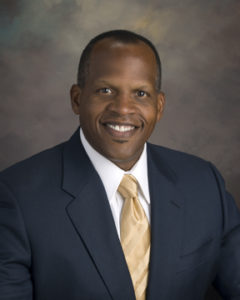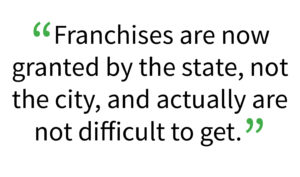Morgan Hill like the vast majority of cities across the nation is limited to a single cable broadband service provider
By Rich Constantine

Rich Constantine
Our community experienced a severe communications outage Feb. 3 that affected our residents, our businesses, and our local students. It was a lost day for many of us at a time when we could ill afford to lose a day. While the contractor that cut the fiber that caused the outage has been identified, nothing can be done to give us all our day back.
We recognize this is the third catastrophic outage the community has experienced in the past 12 years. While each outage had a completely different cause and occurred at completely different locations, the net effect remained the same. While we have consistently advocated for broadband redundancy, we have not had any success in obtaining it. During this time, our society has transitioned to depend more and more on fast and reliable Internet access. Having this outage occur while so many of us are working and studying from home, was especially painful. We regret that the city has been unable to convince our local incumbent cable and local telephone providers to build redundancy into their systems and vow to work harder on this issue.
 Many years ago the city of Morgan Hill was responsible for directly managing its own cable franchise, however, this changed in 2006 when the State of California passed Assembly Bill 2987 better known as the Digital Infrastructure and Video Competition Act of 2006 (DIVCA), moving oversight of cable franchises to the California Public Utilities Commission (CPUC).
Many years ago the city of Morgan Hill was responsible for directly managing its own cable franchise, however, this changed in 2006 when the State of California passed Assembly Bill 2987 better known as the Digital Infrastructure and Video Competition Act of 2006 (DIVCA), moving oversight of cable franchises to the California Public Utilities Commission (CPUC).
Franchises are now granted by the state, not the city, and actually are not difficult to get. However, it is economic factors that prevent new franchises from coming into the market. As is the case with water service, gas service, electric service, sewer service, or landline phone service, extensive investment is needed to construct the infrastructure to provide new broadband service. Spectrum currently owns all of the infrastructure throughout the city that provides their broadband service, and any new company would need to spend tens to hundreds of millions of dollars to construct an alternative system. With that level of investment required just to build a new system, rates would be astronomically higher than those that Spectrum can offer.
 Morgan Hill is not unique in this dilemma as the vast majority of cities across the nation are limited to a single cable broadband service provider. It is believed that future competition for broadband services will come from wireless providers as their technologies become more robust and at a lower cost. In fact, many people today in Morgan Hill receive service from a host of local companies providing both wired and wireless broadband access. It is expected that these local companies will continue to prosper and expand their service offerings.
Morgan Hill is not unique in this dilemma as the vast majority of cities across the nation are limited to a single cable broadband service provider. It is believed that future competition for broadband services will come from wireless providers as their technologies become more robust and at a lower cost. In fact, many people today in Morgan Hill receive service from a host of local companies providing both wired and wireless broadband access. It is expected that these local companies will continue to prosper and expand their service offerings.
The city has tried to work to encourage improved telecommunications through the limited resources and means that are available. The city has contacted other broadband service providers.
The city has made efforts to incentivize companies to enter the Morgan Hill market. This work has included setting up small cell standards that could support wireless providers, utilizing city infrastructure projects to place conduit in the community, and, most recently, issuing a request for proposal for city facility infrastructure that was expanded to try to incentivize new fiber installation to support the greater community.
 The city understands these efforts have only a very small impact as compared to what the private broadband provider is able to do. Knowing this, the city has recently reached out to the California Public Utilities Commission (CPUC) and our state representatives, asking that they also demand and require Spectrum to improve service in our community and create needed redundancy. We encourage our residents to do the same.
The city understands these efforts have only a very small impact as compared to what the private broadband provider is able to do. Knowing this, the city has recently reached out to the California Public Utilities Commission (CPUC) and our state representatives, asking that they also demand and require Spectrum to improve service in our community and create needed redundancy. We encourage our residents to do the same.
We recognize that many members of the community have previously expressed dissatisfaction with the broadband services provided by Spectrum. To address this, the city was already planning a series of three workshops designed to provide the community with information on how we got to where we are today, what changes may be on the horizon, and what residents can do to improve their service. We hope that you will join us at 7 p.m. Feb. 24, March 24, and April 28.
Working together — local government and the community — is the only way we will be able to impact change on this important issue.
Rich Constantine is the mayor of Morgan Hill. He wrote this column for Morgan Hill Life.






